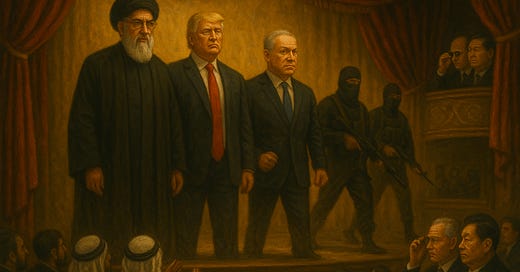No Applause Yet: A Play in Blood and Uranium
In the theatre of Middle Eastern power, applause is premature. The final act has yet to burn its name into history.
Act I: The Stage Is Set with Ash and Ambition
The curtain rises over a scorched script, one written long before the missiles lit the sky.
This isn’t a war of trenches. It’s a war of ideologies, proxies, and timelines—a performance between survival and supremacy.
At center stage stands Iran, draped in the last ceremonial robe of Islamism-as-state.
Its fingers stir the cauldron of conflict, feeding Hamas in Gaza, Hezbollah in Lebanon, and the mythology of martyrdom.
It is not new to this role—it is the playwright and the pyromancer.
But this time, Israel stole the opening act.
A strike—surgical, sudden, exact—disrupted Iran’s nuclear rhythm.
Three sites. Three shocks.
And as the dust swirled, America stepped in—not as audience, but as producer of Act II.
Yet even villains learn timing.
Iran had already moved its uranium—its bomb-heart now stored in shadows. Not destroyed. Not lost.
Just… waiting.
Act II: The Audience Divided
The theatre is full, but not all clap.
Some seats belong to America’s allies—Gulf royals in suits, nodding politely, eyes calculating beneath polished keffiyehs.
Others sit cloaked in silence—disdainful of the empire but chained by impotence.
They can mutter, but not march.
The Arab world splits in two:
Those who applaud quietly, grateful someone else is holding the knife to Iran.
And those who boil in silence, stripped of the power to act but burning still.
Up in the opera box, Russia and China peer down, gold-rimmed glasses resting on cold stares.
They do not intervene.
Not yet.
Their moment lies elsewhere—in a later act, a different war.
Tonight, they simply watch.
And so do we.
Act III: The Interlude of Shadows
Applause echoes in Tel Aviv and Washington.
But the wise don’t clap during intermission.
Iran breathes still.
Its regime chants.
Its proxies wait—
Houthis in Yemen, Shiite militias in Iraq, and ghost hands elsewhere, prepared to strike in retaliation’s name.
America knows this.
So it emptied its bases across the Middle East—like a magician removing the sword from his own neck before the trick can turn fatal.
This is not cowardice.
It’s the choreography of survival.
Act IV: The Real Target is Time
Here lies the hard truth, beneath the stage fog:
Iran didn’t lose its uranium.
It lost time.
And time is everything in this nuclear opera.
If the regime survives this war, it will return—quieter, smarter, more resolved.
The centrifuges will spin again, not with vengeance, but with precision.
That’s why bruises won’t suffice.
This war cannot end in a pause. It must end in regime collapse.
Because this is not about revenge anymore.
It’s about rewriting history before Iran writes it in radioactive ink.
Final Act: Do Not Applaud Yet
The theatre is smoky.
The actors are still moving.
The villains are bleeding—but alive.
This is not the time for ovation.
This is the time for vigilance, for decisiveness, for vision.
The show ends only when Iran’s regime is no longer able to chant death to the West, no longer able to build bombs in basements, no longer able to command proxy armies through sacred lies.
The show ends only when Islamism-as-state is pulled from its final stronghold.
Only then… should we rise to applaud.
Until that moment—
Watch. Wait. And hold your breath.






Your concerns are confirmed. 900 pounds of enriched uranium is "missing" from the international radar. The IRGC regime is most likely continuing its nuclear program in other locations.